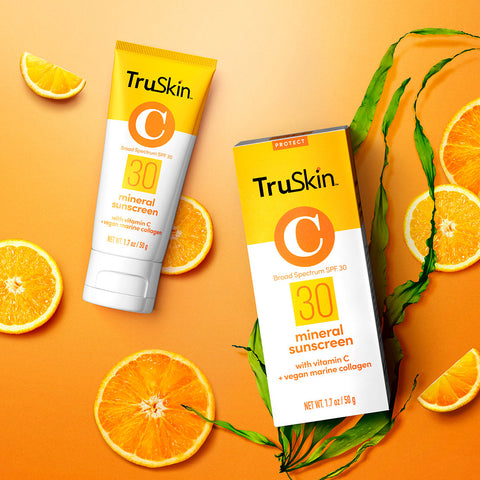
How To Beat Facial Redness In The Summer Heat
No matter the culprit of your facial redness, hot weather can be a beast. Here’s how to battle unwanted summertime inflammation with awesome skincare choices.
Facial redness can be caused by a number of different factors, but whatever the reason for your pesky flushing, the underlying issue is inflammation which makes your blood vessels dilate to allow your immune system to deal with the affected areas more swiftly. It’s basically the human body at its best. But it’s annoying at the same time because it forces blood to the surface of your skin. And blood = redness.
Inflammation can be down to the simplest of things. Too much alcohol or spicy foods, for example, can send some people’s skin into redness overdrive. As can certain overly pokey ingredients in your skincare routine. Then, there are the more tricky underlying issues such as autoimmune diseases or chronic skin woes like rosacea, seborrheic dermatitis, eczema and acne, all of which can cause unwanted flare-ups – including redness, among many other things.
Sunlight and heat can also be a major trigger, irritating the skin and basically fanning the flames of skin inflammation, or skinflammation, if you will.
So, what’s the plan? Well, dealing with inflammation is not the easiest of tasks. But it’s doable, for sure. Read on for five important ways to help prevent facial redness as the mercury rises.
1. Be Kind To Your Barrier Function
A strong, healthy barrier function is crucial when it comes to almost every single issue with your skin – but especially with things like flushing and inflammation. How so? Well, your skin’s barrier is the uppermost layer of your skin which is like a brick wall built from around 20 layers of cells. This intricate layer is super important because it provides your body with its first line of defense against things like pollution, allergens and other irritating environmental stressors that can trigger facial redness with lightning speeds. It basically keeps out the bad guys, while retaining vital moisture to ensure your skin stays soft, supple and healthy.
So, how can you look after it to the absolute max? By keeping a strict eye on what you put on your skin, that’s how. Avoid ingredients like peppermint, synthetic fragrance, parabens, phthalates and strong alcohol and go steady with active ingredients like retinol, glycolic acid and vitamin C. These can be fantastic for the look and feel of your skin, but too much of a good thing can cause irritation.
Of course, you can still enjoy the benefits of active ingredients but if your skin is unhappy, don’t push it. Hone down your application to alternative days or just a couple of times a week. And if it’s still feeling blue (sorry, red!)? Try switching to a kind-to-skin serum like our Niacinamide (B3) Facial Serum. Studies show that niacinamide is extremely effective for treating inflammatory skin by increasing the production of ceramides in its top layers. They're the waxy lipids that help retain moisture, reduce irritation and protect your skin from external nasties, btw.
2. Make Sunscreen Your Most Important Skincare Habit
If you weren’t yet aware (c’mon, where HAVE you been?), safeguarding your skin from the punishing UV rays with an effective, broad-spectrum sunscreen is everything. It protects your collagen from breaking down and aging you up super fast. It also stops melanin from going crazy and making your skin look patchy and uneven. And don’t even get us started on skin cancer.
In terms of facial redness, UV light is a major trigger of inflammation so sunscreen can be a very useful tool for helping to break the cycle – especially if you have rosacea.
Make sure you apply a mineral-rich sunscreen every morning (mineral formulations are less irritating for sensitive skin than chemical ones) and reapply every couple of hours after prolonged sun exposure.
Other key ingredients to look out for include cooling, soothing aloe and cucumber extract – both of which you’ll find in our awesome SPF 30 Mineral Sunscreen with Vitamin C.
3. Go Big On Cooling, Anti-Inflammatory Foods
While spicy foods, caffeine and alcohol are very common food triggers for inflammation there are plenty of excellent foods that have incredible anti-inflammatory benefits. Fresh veggies like squash, cucumber, leafy greens, broccoli and celery, for starters, are definitely your friend. As are oily fish, berries, avocados, olive oil and nuts.
And don’t forget your humble glass of cooling, fresh water which helps to keep your digestive system in good working order, thereby reducing inflammation. Sounds simple when we put it like that, right? That’s because it is.
4. Avoid Over-Exfoliation
One of the worst things you can do if you suffer with ‘hot weather’ facial redness is to exfoliate too vigorously or, worse still, too often. Harsh scrubs, facial mitts and cleansing brushes are just going to be too much for your skin if you use them on a daily basis, especially if you combine them with a nightly retinol routine as well.
Limit your use of exfoliants to days when you know you’re going to be out of the sun and even then, only apply the gentlest of formulations. Try our Vitamin C Gentle Face Scrub or 6% AHA, BHA + PHA Liquid Exfoliant which is a great, non-abrasive option that takes care of business even if you only use it once or twice a week.
5. Try A Cool Compress
If your redness is down to plain old heat (or one too many glasses of wine), one of the quickest and easiest ways to calm it down is to apply a cool compress to your skin. Cold temperatures cause the blood vessels to contract, therefore reducing blood flow to your skin and lessening any redness you may be experiencing.
Grab a clean washcloth, run it under cold water for a few seconds, then wring it out and lay it over your face for a minute or so. It’s amazing how much this simple trick really does work.
Experts agree, however, that coldness can actually make some types of facial redness – rosacea, in particular – worse, so tread carefully. And avoid applying actual ice cubes directly to your skin. Tiktokers may say otherwise, but ice can strip your skin of natural oils and compromise your barrier function.









